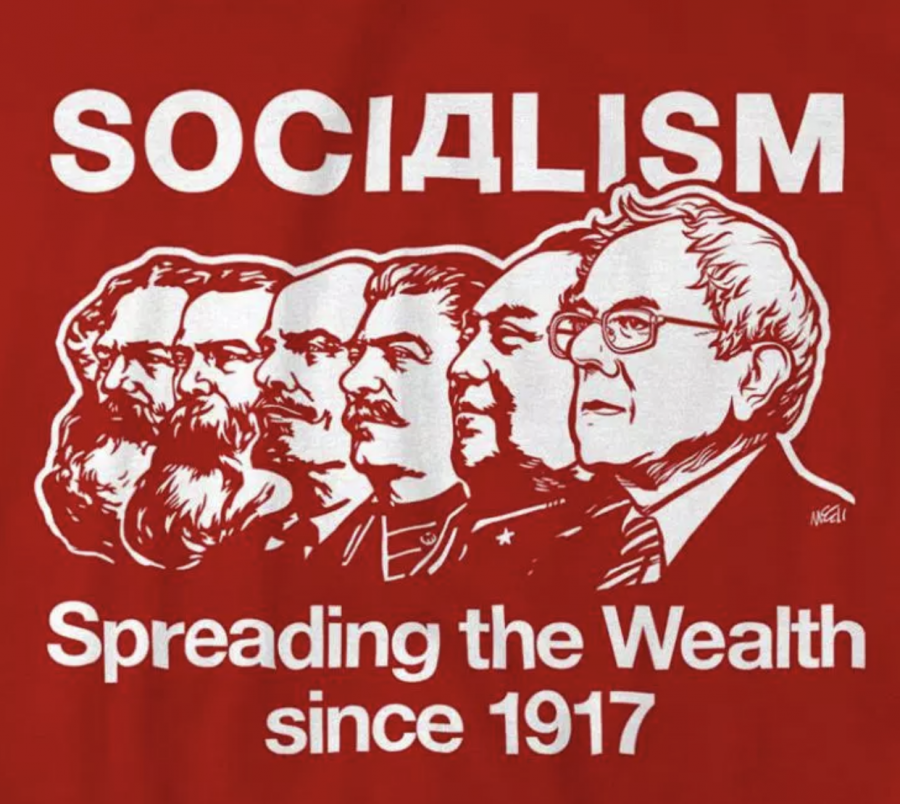Redefining Socialism: Bringing Hope Back to the Democratic Platform
A T-shirt design meant to disparage socialists from Karl Marx to Bernie Sanders. (COURTESY OF LIBERTYCADRE.COM)
November 7, 2018
With midterm elections coming up, politics are starting to take center stage in many Americans’ minds once again. This particular election cycle has been especially publicized in the media; call it a facet of the “Trump Factor” if you’d like.
People are once again coming out of the woodwork to have their voices heard in a particularly virulent election cycle, and there is a high probability that we will see some major governmental changes moving forward.
Characteristic of our current political dialogue, there is much division expected between party lines this November. Both sides are angry, energized and ready to take more seats across the country. However, the Democratic party’s lack of a centralized message is particularly interesting, especially looking forward to 2020. Instead of working on a national platform, Democrats by-and-large seem to be targeting their local constituencies promising “real change that works.”
In fact, the only major link between Democratic candidates across the U.S. is the idea that they are anti-Trump. While that strategy certainly works for most of their base right now, Democrats cannot continue to keep their rhetoric so negative and directionless going forward.
It’s all too easy to stoop to the level of President Trump when it comes to political rhetoric, but there is untapped potential in social moderates’ desire for a return to political normalcy. I’m not advocating for a particular candidate for the Democratic primary quite yet — it’s way too early to make that call, but I do think we need to start redefining the way in which the left is viewed in America.
The primary term that needs redefining is socialism.
The word typically brings to mind one of two things: a violent Marxist-Leninist society built on equal wealth distribution or a 70-something-year-old man with a thick Brooklyn accent shouting about a “revolution.” Arguments in favor of the economic system which is prevalent in Europe are often brushed off with a comment about socialism’s incompatibility with American lifestyles and a criticism of the individual foolish enough to even bring it up in the first place.
The truth is that America and socialist European countries have long been providing their citizens with the very same services. The difference is that America has constructed the means by which we gain access to these services — human rights of education, healthcare, housing, food and public safety — in such a way that, for many, social mobility is nearly impossible. Our society is built to keep people in the social spheres they were born in, from the laws surrounding business ownership to the price of a college degree.
Socialism as a concept neither implies nor encourages the redistribution of wealth in a society, contrary to what Fox News might tell you. Socialism, as it exists in the 21st century, is the government ownership of goods and services deemed necessary for a society to function smoothly.
In countries across Europe from Germany to Sweden to Ireland, this is most typically achieved by having the federal government institute organizations to take charge of specific needs. America’s own strategy, created in the 1980s under the Reagan Administration, combines the use of official government bodies with private companies contracted to provide services on behalf of the U.S.
The issue with America’s version of providing social services is that private companies that are owned by individuals are not motivated by altruism or a sense of service to the people. Instead, they are driven by profit margins and investment returns, motivations not inherently negative but undoubtedly problematic in the delivery of fundamental needs to a population.
Take the opioid epidemic, for instance. If government-owned organizations were in charge of the healthcare and pharmaceutical industries, the primary goal would be helping the thousands of Americans dying every month.
Instead, preserving human lives takes a backseat to making sure investors are happy. A dead father in Indiana is only part of a larger calculus that involves stock returns, insurance rates, production costs and demand for medication. It should not be considered un-American to assert that private business should only capitalize on the wants and comforts of a society, not on the fundamental human rights of its people. It is not radical to believe that a government in the 21st century should provide for an individual’s basic needs if it can.
Unfortunately, our national political dialogue claims just that. And far too many people — particularly those on the right — lambaste socialists as “enemies of the state.” November presents us with a monumental opportunity to vote Democrats into office and begin working against the injustices imposed on Americans from the White House in the last two years. Between defending net neutrality to respecting the basic human rights of immigrants, it’s up to us, the young Americans concerned for the future of our country, to elect the kinds of Democrats who will reform the very systems that suppress so many young and working-class voters.
Unfortunately, the current Democratic platform as a whole does not endorse the socialization of private services on a meaningful scale, a strategy which could fundamentally change the systematic oppression of so many in our society. This is exactly why the socialist undercurrents taking hold of voters right now are so important; here lies an opportunity to bring back hope to the Democratic Party.
There are socialist candidates ready to make the kind of changes we need to heal the gaping wounds brought about by social stratification and identity politics. These are the candidates worth watching — and supporting — during this midterm cycle and into 2020.
The reason we should have so much confidence in the message of socialist candidates is simple: socialism at its fundamental level advocates for the social cohesion of America. And today, when it seems like the political stability of our country is deteriorating, a message of unity and mutual respect may be exactly what we need to begin rebuilding our political system into one we can be proud of.
And frankly, there’s no better place than New York City for young, politically-minded individuals to invest in a socialist reform of the United States. Alexandria Ocasio-Cortez, the veritable face of the modern socialist platform, is slated to win her congressional district in the Bronx and Queens by a landslide. She has run on a platform considered “far-left” for American politics, advocating for the forgiveness of student debt, abolishment of private prisons and accessible healthcare for all.
Running for Governor of New York on a very similar platform was Cynthia Nixon, a self-proclaimed socialist. She amassed an impressive one-third of the vote running against incumbent Andrew Cuomo. All across New York State, socialists have galvanized to combat the far-right, but there is still a lot of fracturing among Democratic Party lines.
New York City has the potential to be the home of a new platform for the Democratic Party. With faces like Ocasio-Cortez, Nixon and Brooklyn native Senator Bernie Sanders, our city is ready to share with the country a new era of unity and acceptance in American politics: one that is needed now more than ever.
Our goal as college students should be to redefine the word “socialism” in our communities, both here at Fordham and at home. It is not nearly as scary or radical as many people in our country think, and it seems to be successful in New York. Socialist platforms that are based on the issues, not just the party, have a real chance at reshaping our country’s political outlook.
Instead of treating the word like a dirty, hurtful thing, “politics” can become the way by which we solve the problems in society. Let’s help people realize that public service is just that — a service for the public — not just a place for the elite to return on the investments of their financial backers.
All people in this country deserve a voice, and socialism advocates for exactly that. If we can redefine that word in this country, it can become a banner for the voiceless to rally behind. We have the opportunity this November to reshape the political dialogue of this country, but that can only be done when the forgotten are heard. Let’s make sure they are.














V. Dargain • Jul 23, 2023 at 11:19 pm
I thought American voters already made their decision about feeling socialism’s Bern . Maybe not .
Bruh • Jan 17, 2020 at 2:35 pm
This whole article is a cluster fuck and I believe you have no brain, social science makes you an expert on economics?
V. Dargain • Jul 23, 2023 at 11:16 pm
Hahahahaha ! Good one . Speak your mind bruh . That’s what the first Constitutional amendment was written for .